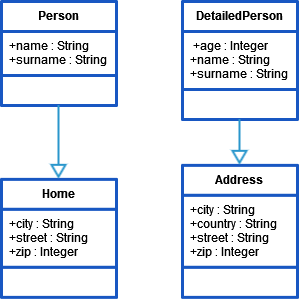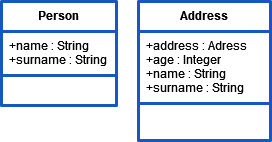- Created by Kirstin Seidel-Gebert, last modified by Annegret Bernhardt on Jan 05, 2024
| Syntax | set aTargetObject = anInputObject.mapEqualNames([anotherInputObject]+); append mapEqualNames(anInputObject) to anArrayOfTargetObjects; | |
|---|---|---|
| Semantics | The macro generates set statements for all equal named, equally typed attributes found in the target object and at least one of the input objects. This applies to all public attributes including all inherited attributes. You can supply multiple input objects. This macro does not work recursively and thus do not perform a deep copy of attributes of complex types. | |
| Substitutables | anInputObject, anotherInputObject | Can be any complex object having attributes of any type. |
| Examples | set person = person1.mapEqualNames(person2, person3); set person.address = mapEqualNames(address); set person.alternativeAddress = detailedPerson.address.mapEqualNames(); set person.adress = mapEqualNames(detailedPerson.addresses[0]); append mapEqualNames(detailedPerson) to people; | |
Given are the two unrelated classes Person and DetailedPerson . This statement assigns values to the matching attributes of object personOut which is of type Person : age and country remain unset. The object personIn2 is of type DetailedPerson . The properties of personIn1 get overwritten with existing values. The value of street remains unchanged, because it did not exist in the source object personIn2 (was NULL). You can use Given are the two unrelated classes Person and DetailedPerson. Result array:Usage of mapEqualNames()

Data / Script Description / Result personIn {
age: 45,
name: "Rose",
surname: "Bloom",
city: "San Francisco",
country: "USA",
street: "7, Waterfall Av.",
zip: 94016}
The object personIn is of type DetailedPerson . set personOut = mapEqualNames(personIn);
personOut {
name: "Rose",
surname: "Bloom",
city: "San Francisco",
street: "7, Waterfall Av.",
zip: 94016
}Usage of "mapEqualNamesIfExists()"
Data / Script Description / Result personIn1 {
name: "John Robert Edward",
surname: "Snow",
city: "Anchorage",
street: "99, Malamute Street",
zip: 0
}The object personIn1 of type Person already contains values.
In our example, the zip code is unknown, so the attribute zip contains the value 0 .personIn2 {
age: 32,
name: "John",
surname: "Snow",
city: "Anchorage",
country: "USA",
zip: 12345
}
In this example object, the attribute street is not given.set personIn1 = mapEqualNamesIfExists(personIn2);
This statement assigns values from personIn2 to the matching attributes of personIn1 : personIn1 {
name: "John",
surname: "Snow",
city: "Anchorage",
street: "99, Malamute Street",
zip: 12345 }Usage of mapEqualNames() with the "append" Statement
mapEqualNames() along with the append statement to add a complex object with numerous attributes to an array of unrelated objects which needs only some of the information. The mapEqualNames()macro will create set statements for all equal named attributes found in the target object while the append statement will add the result to an array.
Data / Script Description / Result aDetailedPerson {
adress: {
city: "San Francisco",
country: "USA",
street: "7, Waterfall Av.",
zip: 94016
}
age: 45,
name: "Rose",
surname: "Bloom"
}Assume that aDetailedPerson is provided from an external source. For further processing, we are interested in name and surname only. append mapEqualNames(aDetailedPerson) to customers;
mapEqualNames() collects the data from aDetailedPerson, and append adds it to the array customers .
customers is an array of type Person and contains already the data of " John Snow " and " Liv Falls ".
customers [
{name: "John", surname: "Snow";}
{name: "Liv", surname: "Falls";}
{name: "Rose", surname: "Bloom";}
]
- No labels